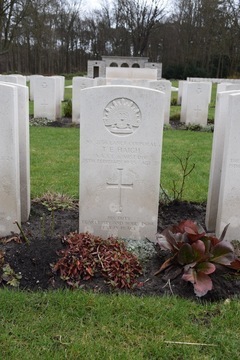
HAIGH, Thomas Edward
| Service Number: | NX2186 |
|---|---|
| Enlisted: | 25 October 1939 |
| Last Rank: | Lance Corporal |
| Last Unit: | Not yet discovered |
| Born: | Stokers Siding, New South Wales, Australia , 19 September 1917 |
| Home Town: | Not yet discovered |
| Schooling: | Not yet discovered |
| Occupation: | Not yet discovered |
| Died: | Illness, Germany, 25 February 1945, aged 27 years |
| Cemetery: |
Berlin 1939-45 War Cemetery 14 F 7 |
| Memorials: | Australian War Memorial Roll of Honour, Ballarat Australian Ex-Prisoners of War Memorial, Tregeagle Public School WW2 Flagpole |
World War 2 Service
| 3 Sep 1939: | Involvement Lance Corporal, NX2186 | |
|---|---|---|
| 25 Oct 1939: | Enlisted Australian Military Forces (WW2) , Lance Corporal, NX2186 |
Thomas Edward Haigh - personal story
Thomas Edward Haigh (known as Ted) no doubt named after his Uncle Ted who died at 18 1/2, he was born at Stokers Siding on 19th September, 1917. Ted never married. He was one of the first Tweed young men to join up at the outbreak of War in September, 1939, when Hitler invaded Poland, and England declared war on Germany. Ted joined up in October, 1939, in Murwillumbah
Ted did his basic training in Sydney (travelling by rail) came home for a final leave for Christmas 1939, and was part of the first expedition leaving Australia by ship for the Middle East in January 1940.
He was taken a Prisoner of War at Crete (when the British abandoned Greece when the Germans came overland) and a similar occurrence to Dunkirk happened attempting to get the combined troops off Greece to Crete. 15,000 allied troops were captured by the Germans over several days in 1941.
Ted finished up in Stalag XXA in Poland near present day Torun, south of Gdansk. He remained a POW until 1945. As the Allies made their push up through France towards the end of the war in Europe, the Russians took the opportunity to push the Germans back through Poland. Hitler and his troops tried to starve out the Russians earlier in the war, so they wanted revenge. They pushed through Poland, driving the Germans before them.
The German soldiers guarding the POWs in Stalag XXA, ordered their prisoners on a forced march, in the middle of a severe winter, on the main road towards Germany and the city of New Brandenburg, on foot, with little or inadequate clothing, no food, and were shot or bayoneted if they could not keep up.
Of about 2000 POWS who left Stalag XXA, only about 200 odd made it to Germany until repatriated by the Allied troops. My Uncle Ted had a severe form of dysentery when he left the camp, and near New Brandenburg (just inside Germany) he either went to relieve himself on the side of the road, or tried to escape, and was bayoneted by his German captors. He died on 25th February, 1945, at New Brandenburg of gangrene of the lungs, and was initially buried there, but the Australian War Graves Commission subsequently moved his remains after the war to the British War Cemetery in Berlin.
Submitted 28 May 2019 by Neil Dmitrieff









